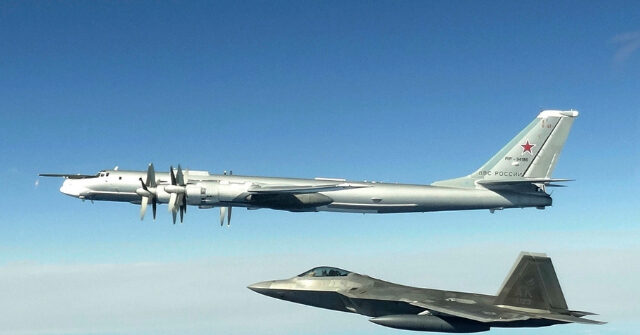The United States and Canada scrambled fighters on Wednesday as Chinese and Russian nuclear-capable bombers flew off the coast of Alaska.
According to the North American Aerospace Defense Command (NORAD), it was the first time a Chinese H-6 bomber had penetrated Alaska’s Air Defense Identification Zone (ADIZ).
An ADIZ is a buffer region surrounding a nation’s sovereign airspace. Sending military planes into another nation’s ADIZ is not an act of war, but it is considered provocative, especially since fighters will usually be launched to monitor the incoming aircraft and ensure they are not a threat.
China frequently sends warplanes into the ADIZ of Taiwan, for example, forcing the much smaller Taiwanese air force to exhaust itself in response — a tactic known as “gray zone” warfare.
NORAD noted that Russian bombers have entered Alaska’s ADIZ before, most recently in May, but this appears to be the first time Chinese bombers have accompanied them.
NORAD said it “detected, tracked, and intercepted two Russian TU-95 and two PRC [People’s Republic of China] H-6 military aircraft” in the Alaskan ADIZ. The U.S. sent F-16 and F-35 fighters to monitor their activities, while Canada launched CF-18 fighters, the Royal Canadian Air Force version of the American F/A-18 Hornet.
“The Russian and PRC aircraft remained in international airspace and did not enter American or Canadian sovereign airspace,” NORAD said.
“This Russian and PRC activity in the Alaska ADIZ is not seen as a threat, and NORAD will continue to monitor competitor activity near North America and meet presence with presence,” the statement added.
A source told Air & Space Forces Magazine on Wednesday that the Chinese and Russian bombers were on a joint patrol and launched from the same Russian airbase.
Chinese Defense Ministry spokesman Col. Zhang Xiaogang confirmed the “strategic joint air patrol” in a press conference on Thursday.
“This is the eighth air strategic joint patrol organized by the two militaries since 2019. It further tested and improved coordination between two air forces and deepened strategic mutual trust and substantive cooperation,” said Zhang.
“This operation did not target any third parties and was in line with relevant international law and practice and had nothing to do with the current international or regional situation,” he insisted.
China has declared itself a “near-Arctic state,” a term Beijing created to give itself a greater role in exploiting Arctic resources. It has spoken of incorporating the Arctic into its infrastructure scheme as a “polar Silk Road” or “Silk Road on ice.”
The Pentagon said on Monday — before the Russian-Chinese joint bomber patrol flew into Alaska’s ADIZ — that it was troubled by growing Russian and Chinese cooperation in the Arctic.
“While significant areas of disagreement between the PRC and Russia remain, their growing alignment in the region is of concern,” a Department of Defense (DOD) report said.
The report said China wants to leverage “changing dynamics in the Arctic to pursue greater influence and access, take advantage of Arctic resources, and play a larger role in regional governance.”








